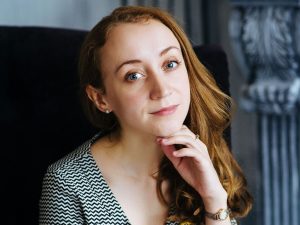Mariia is a full-time student studying for a MSc degree in Education (Comparative and International Education). Before joining the department she completed a 5-year specialist degree in Theoretical and Applied Linguistics in 2012 in Voronezh State University, Russia.
What degree did you apply for and why was it important to you to study this?
Education is a peculiar field of study. Many people, at least in Russia, believe that they know a lot about education just because they experienced it themselves. When it comes to those who are working in this area as teachers, administrative staff or policy-makers, their perception is often further narrowed down and limited to immediate circumstances they are immersed into. Before starting this course, I worked as an educational project manager and education abroad adviser in an amazing company in my hometown which shared my global outlook. Yet, having to explain differences in educational systems to clients and facing the lack of understanding when bringing various practices from abroad, sparkled my interest in the field of CIE.
What do you plan do to when you finish your degree?
I intend to go back to Russia and apply gained knowledge to induce changes in the educational landscape of my hometown. I believe that the best approach when improving education is to think globally but act locally. After all, education is a very personal experience. If I could inspire at least one child and help him or her in pursuing his or her dreams, or perhaps improve teaching practice of at least one teacher so that he or she could do the same for his/her students, I would be quite happy. Although, of course, my plans are somewhat more ambitious.
What do you most value about the teaching at the department?
The most valuable thing, to my mind, is the way course conveyors direct your own learning. They deliver lectures not in “sage on the stage” style but serve as mentors and more-knowledgeable tutors genuinely interested in the field they teach. Their passion towards the subject, open-mindedness, and level of expertise allow them to help their students to ask right questions and to inspire students to look for answers across various countries and various domains of knowledge.
Why do you think it’s important to study education?
Education is one of the universal rights every individual has. However, although the issue of equal access still dominates the discourse in developing countries, the problem of quality is of equal importance. Without high-quality education no advancement is possible in all other fields, be that Physics or Medicine. Education as the way of knowledge transfer between generations allows individuals to acquire information, critically engage with it and come up with new ideas. It is the thread that sews the humankind together through its history and the needle that puncture the fabric of time towards future advancements.
What’s the community like at the department?
The staff is very helpful and engaged. The diversity of student body allowed me to hear opinions on education from all over the world which added a lot to my learning.
What has your degree taught you most?
It taught me to appreciate the multifaceted nature of education, to carefully develop arguments baring in mind the complexity of educational issues, and beware of easy solutions.
How do you get involved in other research activities within the department and what are they?
I was lucky to serve as a research assistant on several projects. One of them was closely connected to my dissertation and was about televised educational game-show popularising reading and teaching reading skills to Kyrgyz primary school students, others were related to internalization of education in the post-Soviet countries.
What’s your favourite thing about studying at the department?
The breadth of research interests and extensive opportunities to exchange ideas.
What’s been your favourite thing about the course to date?
The library and access to cutting-edge publications through SOLO.
What advice would you give to new postgraduate students on how they can get involved in the department community?
I would advise attending as many talks and lectures of the offered seminar series as possible. They are delivered by distinguished researchers and academics from all over the world and are truly enriching.
What further opportunities have you gained so far through your degree?
I was offered a position of the international relations manager in Voronezh State Technological University.
Did you receive any financial support through the University?
I have received Hill Foundation Scholarship which has fully covered all my expenses.

